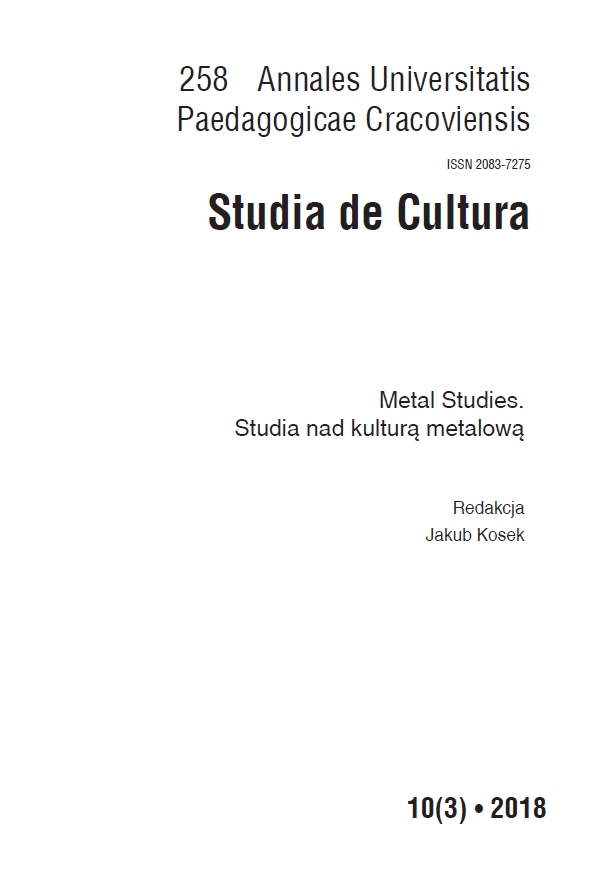Abstract
DOI 10.24917/20837275.10.3.3
Spektakle koncertów zespołów metalowych są widowiskiem o dużym stopniu symbolicznej umowności, która paradoksalnie ma za zadanie wywoływać efekt nieustannej autentyczności wśród widzów i słuchaczy. Prezentowane utwory, a także cały entourage sceniczny i wizerunkowy zespołu stanowi o sile jego podmiotowości w polu lokalnej muzyki metalowej. Bardzo rzadko, a często także niechętnie, mówi się jednak o zakulisowej egzystencji grup metalowych oraz o procesach dyscyplinujących, którym muszą się poddawać, by wywołać określone i oczekiwane efekty wśród słuchaczy. Da się jednak zauważyć krytyczny namysł nad zjawiskiem zakulisowej dyscypliny w metatekstach muzycznych, takich jak komiksy i animacje poświęcone biografiom zespołów fikcyjnych. Teksty te transgresywnie unaoczniają problem masochistycznego spektaklu ciała i przemocowej, choć pozornej, autentyczności grup muzycznych. Przykładami takich tekstów są japońska animacja Detroit Metal City (2008) oraz komiksem Będziesz smażyć się w Piekle autorstwa Krzysztofa „Prosiaka” Owedyka (2016).
Disciplined bodies or transgressive subjects. Somatoesthetics of fictional death and black metal bands
The performances of metal music gropus kind be described as a spectacles of a high degree of symbolic convention, which is paradoxically intended to cause the effect of constant authenticity among spectators and listeners. However, it is diffucult to find any kind of material that shows behind-the-scenes existance of those gropus, we can find critical reflection on the phenomenon of behind-the-scenes discipline in meta-music texts, such as comics and animations devoted to the biographies of fictional music groups. These texts transgress the problem of the masochistic spectacle of the body fictional authenticity of the musical groups. Examples of such texts are the Japanese animation Detroit Metal City (2008) and the Polish comic Będziesz smażyć się w Piekle by Krzysztof “Prosiak” Owedyk (2016).
References
Foucault Michael. 1993. Nadzorować i karać. Narodziny więzienia. T. Komendant (przeł.). Warszawa.
View in Google Scholar
Frith Simon. 2011. Sceniczne rytuały. O wartości muzyki popularnej. M. Król (przeł.). Kraków.
View in Google Scholar
Lipsitz G.eorge 2007. Pop Stars: The Hidden History of Digital Capitalism. W G. Lipsitz, Footsteps in the Dark. The Hidden Histories of Popular Music. Minneapolis.
View in Google Scholar
Moore Alan F. 2001. “Categorical Conventions in Music Discourse: Style and Genre”. Music & Letters nr 82(3). 432–442.
View in Google Scholar
Moore Allan. 2002. “Authenticity as Authentication”. Popular Music nr 21(2). 209–223.
View in Google Scholar
Owedyk Krzysztof. 2016. Będziesz smażyć się w piekle. Warszawa.
View in Google Scholar
Purcell Natalie J. 2003. Death Metal Music. The Passion and Politics of Subculture. Londyn.
View in Google Scholar
Ranciere Jacques 2007. Dzielenie postrzegalnego. J. Sowa (przeł.). Kraków.
View in Google Scholar
Reyer Ian. 2013. “Blacker than Death: Recollecting the «Black Turn» in Metal Aesthetics”. Journal of Popular Music Studies nr 25(2).
View in Google Scholar
Sierzputowski Konrad. 2018. Słuchając hologramu. Cielesność wirtualnych zespołów animowanych. Poznań.
View in Google Scholar
Szarecki Artur. 2017. Kapitalizm somatyczny. Ciało i władza w kulturze korporacyjnej. Warszawa.
View in Google Scholar

